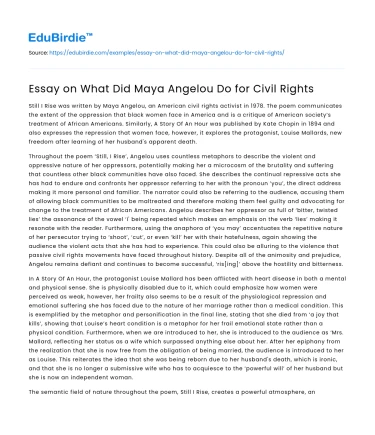Still I Rise was written by Maya Angelou, an American civil rights activist in 1978. The poem communicates the extent of the oppression that black women face in America and is a critique of American society’s treatment of African Americans. Similarly, A Story Of An Hour was published by Kate Chopin in 1894 and also expresses the repression that women face, however, it explores the protagonist, Louise Mallards, new freedom after learning of her husband's apparent death.
Throughout the poem ‘Still, I Rise’, Angelou uses countless metaphors to describe the violent and oppressive nature of her oppressors, potentially making her a microcosm of the brutality and suffering that countless other black communities have also faced. She describes the continual repressive acts she has had to endure and confronts her oppressor referring to her with the pronoun ‘you’, the direct address making it more personal and familiar. The narrator could also be referring to the audience, accusing them of allowing black communities to be maltreated and therefore making them feel guilty and advocating for change to the treatment of African Americans. Angelou describes her oppressor as full of ‘bitter, twisted lies’ the assonance of the vowel ‘i' being repeated which makes an emphasis on the verb ‘lies’ making it resonate with the reader. Furthermore, using the anaphora of ‘you may’ accentuates the repetitive nature of her persecutor trying to ‘shoot’, ‘cut’, or even ‘kill’ her with their hatefulness, again showing the audience the violent acts that she has had to experience. This could also be alluring to the violence that passive civil rights movements have faced throughout history. Despite all of the animosity and prejudice, Angelou remains defiant and continues to become successful, ‘ris[ing]’ above the hostility and bitterness.
Save your time!
We can take care of your essay
- Proper editing and formatting
- Free revision, title page, and bibliography
- Flexible prices and money-back guarantee
In A Story Of An Hour, the protagonist Louise Mallard has been afflicted with heart disease in both a mental and physical sense. She is physically disabled due to it, which could emphasize how women were perceived as weak, however, her frailty also seems to be a result of the physiological repression and emotional suffering she has faced due to the nature of her marriage rather than a medical condition. This is exemplified by the metaphor and personification in the final line, stating that she died from ‘a joy that kills’, showing that Louise’s heart condition is a metaphor for her frail emotional state rather than a physical condition. Furthermore, when we are introduced to her, she is introduced to the audience as ‘Mrs. Mallard, reflecting her status as a wife which surpassed anything else about her. After her epiphany from the realization that she is now free from the obligation of being married, the audience is introduced to her as Louise. This reiterates the idea that she was being reborn due to her husband's death, which is ironic, and that she is no longer a submissive wife who has to acquiesce to the ‘powerful will’ of her husband but she is now an independent woman.
The semantic field of nature throughout the poem, Still I Rise, creates a powerful atmosphere, and presents Angelou as an unassailable woman, a force of nature. Angelou describes herself as a ‘black ocean’, the adjective ‘black’ denotes her race and the symbolism attached to the ocean has connotations of power, which is reiterated through the defiant and authoritative tone. This is admirable to contemporary audiences as she is breaking down the traditional perceptions of women being feeble, just like Louise Mallard in A Story Of An Hour. Furthermore, by being illustrated as an unassailable woman, Angelou creates a sense of irony because her oppressors, who have ‘trod[den’ her in the ‘dirt’ and attempted to prevent her from moving forward have strengthened her defiant nature and encouraged her to ‘rise’ up again. The repetitive refrain ‘still I rise’ shows her continued resistance against her persecutors, this resonates with the reader and encourages them to be resilient even when facing maltreatment and injustice.






 Stuck on your essay?
Stuck on your essay?

